 Petzlover
Petzlover Both Bantam Bulldog and Northern Inuit Dog are originated from United Kingdom. Bantam Bulldog may grow 45 cm / 17 inches shorter than Northern Inuit Dog. Bantam Bulldog may weigh 28 kg / 61 pounds lesser than Northern Inuit Dog. Both Bantam Bulldog and Northern Inuit Dog has same life span. Bantam Bulldog may have less litter size than Northern Inuit Dog. Bantam Bulldog requires Low Maintenance. But Northern Inuit Dog requires Moderate Maintenance
Both Bantam Bulldog and Northern Inuit Dog are originated from United Kingdom. Bantam Bulldog may grow 45 cm / 17 inches shorter than Northern Inuit Dog. Bantam Bulldog may weigh 28 kg / 61 pounds lesser than Northern Inuit Dog. Both Bantam Bulldog and Northern Inuit Dog has same life span. Bantam Bulldog may have less litter size than Northern Inuit Dog. Bantam Bulldog requires Low Maintenance. But Northern Inuit Dog requires Moderate Maintenance
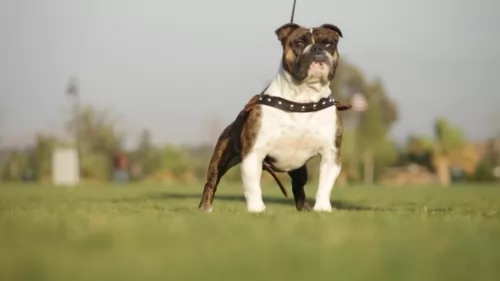 The origin of the Bantam Bulldog goes back to the 1800s, and in fact there is evidence of miniature bull dogs in 1899, In 1902 the smaller bulldog breed was facing extinction, so that it became necessary to import French bulldogs to England to help restore the bantam bulldog breed.
The origin of the Bantam Bulldog goes back to the 1800s, and in fact there is evidence of miniature bull dogs in 1899, In 1902 the smaller bulldog breed was facing extinction, so that it became necessary to import French bulldogs to England to help restore the bantam bulldog breed.
It was only in 2002 that the United Canine Association recognized the English bantam bulldog.
They’re the same as the ordinary bulldog except they are lighter and shorter, although there are slightly larger ones which are as tall as a regular bulldog.
The Bantam bulldogge is related to the English and French bulldogs so that the standards for the bantam breed has similarities to both types.
 Looking at the beautiful Northern Inuit Dog, you’ll think that this crossbred dog is a wolf.
Looking at the beautiful Northern Inuit Dog, you’ll think that this crossbred dog is a wolf.
As with many other dogs, there are sometimes different stories regarding their history. It was in the 1980's that founder of the breed, Eddie Harrison, bred a number of mixed-breed rescue dogs with Siberian Huskies, German Shepherds and Alaskan Malamutes to produce the early Northern Inuit dogs. This is a dog that closely resembled a wolf in looks but which has the more companionable characteristics of the domesticated dog.
The dog is only recognized by its own independent breed club, but by none of the other major kennel clubs.
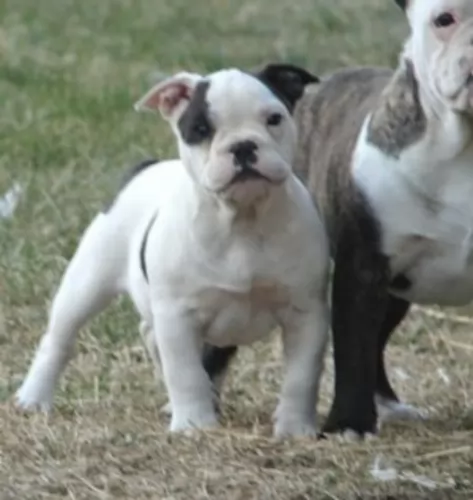 The breed has its origins with the English bulldog, but it was in 2011 that the ‘English’ was abandoned and the name of the dog changed to Bantam Bulldogge. Short to medium in height, and with his large, square head and broad, short muzzle, the dog is short, strong, stout and compact. He had wide apart eyes, short, half-pricked, half-floppy ears and the front legs are also strong and set wide apart.
The breed has its origins with the English bulldog, but it was in 2011 that the ‘English’ was abandoned and the name of the dog changed to Bantam Bulldogge. Short to medium in height, and with his large, square head and broad, short muzzle, the dog is short, strong, stout and compact. He had wide apart eyes, short, half-pricked, half-floppy ears and the front legs are also strong and set wide apart.
He is fit and active with a playful, jovial personality. The Bantam Bulldog is completely at ease with his human family and welcomes visitors to the home. He forms strong bonds with everyone in the family and loves the presence of children in the home too. As with most other dog breeds, he does well with training and socialization – it just makes him a better dog all round. He doesn’t have a problem with accepting other pets in the home.
The coat of the Bantam is short, dense and straight with the skin being tight to the body but looser around the head and neck. Both head and face have moderate wrinkles. The coat is available in all colors and is low maintenance. A good brush twice a week won’t only remove loose hairs and keep his short coat glossy, the mere act of brushing him strengthens the bond between you as well.
 Friendly, calm and gentle, the Northern Inuit Dog is a crossbreed, described as a medium to large sized dog that stands at roughly 58– 81cm in height, male and female, and weighs in the region of 25–48kg.
Friendly, calm and gentle, the Northern Inuit Dog is a crossbreed, described as a medium to large sized dog that stands at roughly 58– 81cm in height, male and female, and weighs in the region of 25–48kg.
He has a double coat in typical wolf shades of grey, white, black and cream. He is regarded as a moderate shedder. The ears are erect, the face bright, intelligent and alert and the tail long, bushy and straight.
The Northern Inuit dog is independent, strong-willed and stubborn, and if you want to own one of these dogs, your dog will respond well if you are firm, fair, strong, kind and consistent. This is because the dog is stubborn, sharp, independent and intelligent.
The owner of such a dog must be a firm leader. Training and socialization should start when the dog is still young. He is good with kids, being playful and affectionate with them.
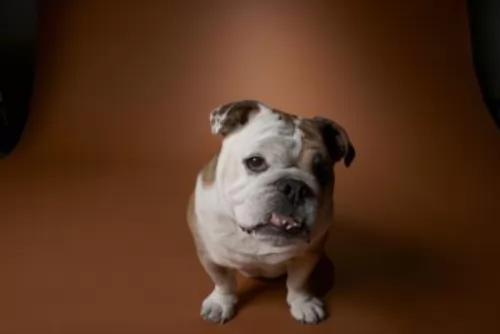 The Bantam Bulldog is full of personality and is active, friendly and social. He is an adaptable pet and will happily live with his human family in an apartment or in a home with a garden. Patient and tolerant, he responds well to the voice of his owner and simple commands are no problem with him as he is quick to learn and to please.
The Bantam Bulldog is full of personality and is active, friendly and social. He is an adaptable pet and will happily live with his human family in an apartment or in a home with a garden. Patient and tolerant, he responds well to the voice of his owner and simple commands are no problem with him as he is quick to learn and to please.
He is never going to be much of a guard dog for you, but he will be a happy, contented, loyal and devoted companion who just wants to be as close to you as he can.
 It’s not surprising that people who love wolves would want a similar looking pet. However, they also want this wolf-like dog to be a friend and companion. This is precisely what they get with the beautiful Northern Inuit dog.
It’s not surprising that people who love wolves would want a similar looking pet. However, they also want this wolf-like dog to be a friend and companion. This is precisely what they get with the beautiful Northern Inuit dog.
With his bright, alert face, the Inuit is actually a calm, gentle dog, bonding closely with his human family and not showing any aggression.
Intelligent and social, and somewhat stubborn, when you provide him with the home he deserves, you’ll see that this beautiful creature can be relied on to be a wonderful family pet.
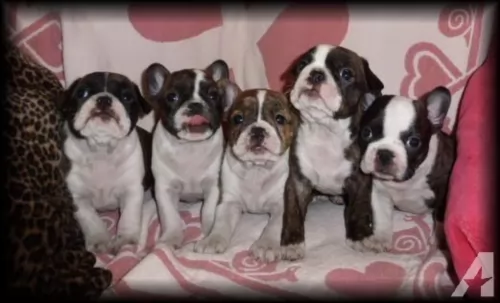 A happy dog is a healthy dog, but the happy Bantam Bulldog will be prone to certain ailments that are common to his breed
A happy dog is a healthy dog, but the happy Bantam Bulldog will be prone to certain ailments that are common to his breed
This breed of dog is prone to have hip dysplasia. Because of their genetic make-up, the soft tissues surrounding the joint develop abnormally and the disease can affect one- or both hips.
Bulldogs can also be prone to digestion issues which amounts to flatulence. This problem however, can be reduced significantly by giving your pet the best diet. Speak to your vet about appropriate foods for dogs with a sensitive stomach. With a sensitive stomach, you want to avoid dog foods with toxic colorants, artificial preservatives and artificial flavors.
Be aware of breathing problems with your bantam bulldog because flat-faced dog breeds such as this can battle with upper airway problems. Symptoms of an obstructed upper airway can include noisy breathing, panting, snoring, rapid breathing and coughing.
 There are some genetic problems with this dog breed, although with good care, you are highly unlikely to see your dog with them.
There are some genetic problems with this dog breed, although with good care, you are highly unlikely to see your dog with them.
Some of these are hip dysplasia and epilepsy.
Hips are always a worrisome aspect with dogs as it can bring on lameness. There are some things that can be done to reduce the incidence of hip dysplasia.
Joint laxity in dogs occurs when the head of the femur doesn’t fit into the acetabulum properly. This could be the result of several things such as the dog being overweight, injury or something else.
Epilepsy in dogs is a chronic condition that results in seizures. This neurological disorder is actually a life-long disease, occurring when there is abnormal electrical activity in the brain and which changes a dog’s behavior.
Some breeds are more predisposed to epilepsy than others but you will need to get your dog to the vet when you see your pet jerking uncontrollably. Most of these epileptic fits happen without warning, they last a few seconds to a minute or so and stop on their own.
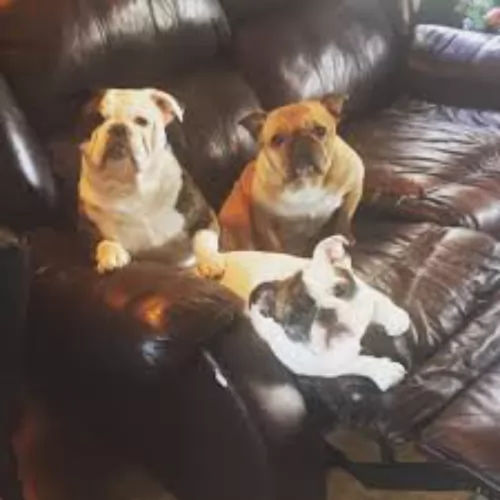 Your Bantam Bulldog needs a lot of protein in his diet. In fact, the Association of American Feed Control Officials have suggested that the dog needs at least 22% of maintenance protein for puppies and 18% of protein for adult dogs. Speak to your vet about wet- and dry dog foods and which foods will suit this particular pet of yours. Always ensure cool, fresh water is within your pet’s reach.
Your Bantam Bulldog needs a lot of protein in his diet. In fact, the Association of American Feed Control Officials have suggested that the dog needs at least 22% of maintenance protein for puppies and 18% of protein for adult dogs. Speak to your vet about wet- and dry dog foods and which foods will suit this particular pet of yours. Always ensure cool, fresh water is within your pet’s reach.
The exercise needs of the Bantam Bulldog are minimal. He is never going to turn down a game of ball with the kids but you don’t have to take him on long walks or runs. He is a social pet, so even though you don’t have to be putting him through an exercise program every day, he doesn’t want to be left alone hour after hour, day after day.
 It’s no longer cheap caring for a dog – just like with a child, by bringing a dog into your home, you have a responsibility to care for it.
It’s no longer cheap caring for a dog – just like with a child, by bringing a dog into your home, you have a responsibility to care for it.
If you bring a puppy into your home, you will need to feed him 4x a day. If you feed him commercially manufactured food it will need to be specially formulated for puppies. You will have to read on the packaging to make sure you get the right food.
Later on your pet can start having one or two meals a day. Two smaller meals is best as then he doesn’t gobble up his food too fast which can lead to a life-threatening condition known as bloat. Home-made food is always a welcome treat for your pet, but keep it simple and consistent. Boiled chicken, brown rice or pasta and some cooked vegetables such as carrots, sweet potatoes and spinach chopped up and added to his dry kibble can offer him some variety from time to time as well as also adding in some raw meat when you get the chance. He must always have access to fresh, cool water.
Your puppy will be due at the vet for his first vaccinations. Your puppy's first vaccination will usually be at about 8 weeks of age.
Your new pet will require a warm, dry, comfortable place to sleep and to retreat to.
You will need to provide him with chewy toys to stimulate him both mentally and physically.
You will need to exercise your pet – nice long walks, ball- and rope games etc.
Nearly every dog sheds, and the Northern Inuit will require you brushing him twice a week to remove all those loose hairs. During the brushing session, check him over for fleas and ticks and run your hands over him and make sure there are no unusual lumps on his body.